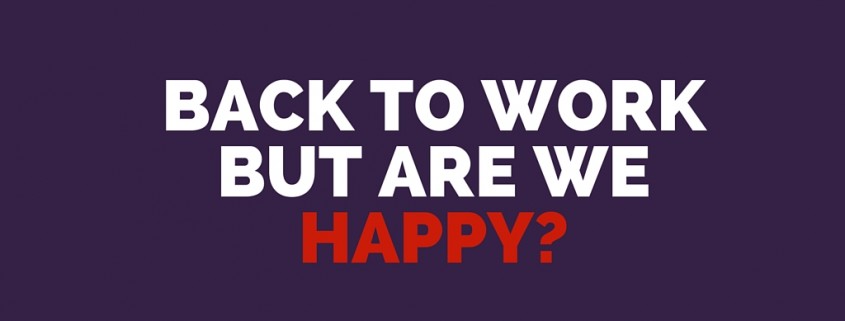Back To Work, But Are We Happy?
A New Survey Measures the Nation’s State Of Mind
A new survey on workplace attitudes reveals that many Britons are genuinely happy in the workplace – but there is still room for improvement.
The Best You magazine’s Life Meaning Survey asked 2000 people in work across the ages, genders and regions about their experience at work. One question, ‘When it comes to your job/career right now, would you say that you love what you do?’…and it gave surprising answers.
While a relatively small percentage (15.4%) gave an unequivocal ‘Yes’, a mass 47% (or 941 people) replied ‘Mostly’. Roughly a quarter responded, ‘Not really’ and 11% said not at all.
The figures were fairly even across genders and ages, with a variation of only one per cent of women feeling more well-disposed to their jobs than their male counterparts, and people between 25-34 being around a percentage point happier than the other groups between 18 and 55+.
Northern Ireland, topped the poll of job satisfaction with 18% giving a joyous ‘Yes’, closely followed by the South West (18%), London (18%) and Scotland (17%). At the other end of the spectrum, only 9% of respondents in Wales were willing to say they love their job.
Asked what would add more happiness to the workplace, 52% said regular salary increases were the key to happiness, while just below came ‘Flexi-time for everyone’. Other high scorers were ‘offices with natural light’ and ‘more emphasis on work-life balance’.
A common theme among those volunteering ideas on how to create more happiness was a change in management, with answers such as ‘a good boss’, ‘good leadership’, ‘less aggressive management’ and ‘bosses that aren’t bullies’ this was representative of many people’s experiences.
Of the 38% dissatisfied with work, over a third were seeking opportunities in a different industry – but just under a third were taking no steps to change their situation, while 3% were seeking life coaching to help them make their choices.
Interestingly, nearly 29% of women and 25% of men admitted to suffering from depression, with 10% more women than men seeking therapy, and five per cent more women consulting their GP. Men also failed to talk to family and friends on the matter, and a higher percentage chose to ‘do nothing’.
THE BEST YOU’S SURVEY FINDINGS
Age counts…
- More than 53% of 55+ have been redundant at least once, while only 13% of 18-24-year-olds have experienced redundancy.
- Employers could be failing to realise an opportunity to develop their staff. Across the ages, fewer than 20% of respondents receive personal development training from their employer, but are more likely to receive sick pay and a pension.
- Most age groups value the same things in the workplace such as flexi-time and sabbaticals, regular salary reviews, continuous professional development and social events. However in-work counselling and therapy was more valued by 18-24-year-olds (21%), while work-life balance was more important to the 45-55+ age group (58%).
- Job satisfaction was least felt by 25-34-year-olds (12%) and most felt by 45-54-year-olds (16%), although all ages described themselves as ‘mostly’ happy.
- Changing job or industry was most seen as a way to improve happiness by 18-34-year-olds (70%).
- Wanting to leave a legacy in the world was most wished for by 18-24-year-olds, while more than 51% of 55+ respondents thought they probably wouldn’t.
- Almost 83% of 55+ respondents believe in personal development, although this was consistently high across the age groups with 80% of 18-24-year-olds also working on their goals to be happy.
- Looking at the media usage of different age groups, 73% of 55+ respondents read personal development books, while 61% of 18-24-year-olds find inspiration online.
- Although similar across the age groups, 35-44-year-olds were most likely to have suffered from depression (30%), and of these 64% sought help from a GP or talked to family and friends (30%).
Postcode happiness…
- In the East Midlands, 27% of people said neither they nor anyone they know are depressed.
- A whopping 87% of people surveyed in Scotland believe personal development is the way to work on their goals to be happy.
- 70% of South West respondents use books as a source of personal development, while 51% of those in the North West prefer blogs online.
- Most hopeful about leaving a legacy are respondents in the South West (20%) while the least hopeful are those in Northern Ireland (18%).
Men vs. Women…
- Flexi-time is more important to women (55% of female respondents) than men (47% of male respondents).
Almost equally across the sexes men and women enjoy their job. - Women are more optimistic about leaving a life legacy (18% of female respondents) than men (14% of male respondents).
- Women who have suffered depression were more likely to have seen a therapist (40% of female respondents) or talked to family or friends (35%) than men (30% of male respondents, and 23% respectively).
Janey Lee Grace speaks alongside Sir Clive Woodward, Jason Vale, Barbara De Angelis, Gill Fielding and Robert Holden appearing at ‘The Best You’ personal development Exhibition at ExCel London on 27 and 28 February 2016.



